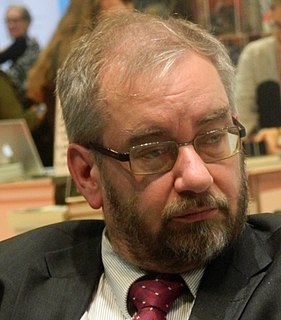 W
WUldis Bērziņš is a Latvian poet and translator.
 W
WJózef Bielawski was a Polish Arabist and scholar of Islam.
 W
WMusa Bigiev was a Tatar philosopher, theologian, publicist and one of the leaders of the Jadid movement. After receiving his education in Kazan, Bukhara, Istanbul and Cairo, he became a political activist for the Ittifaq, the political organisation of the Muslims of Russia. He also taught in Orenburg, wrote journalistic texts and translated classic works into Tatar. After emigrating from the Soviet Union, he travelled Europe and the Middle and Far East while writing and publishing.
 W
WIn Turkey, the Directorate of Religious Affairs is an official state institution established in 1924 under article 136 of the Constitution of Turkey. It is a successor to the Shaykh al-Islām, after the abolition of the Ottoman Caliphate.
 W
WGeorge Grigore is a Romanian writer, essayist, translator, professor, researcher in Middle Eastern Studies.
 W
WJaakko Hämeen-Anttila is a Finnish academic researcher, serving as a professor of the Arabic language and Islamic studies at the University of Edinburgh. Before that he was a professor at the University of Helsinki.
 W
WHans Bague Jassin, better known as HB Jassin, was an Indonesian literary critic, documentarian, and professor. Born in Gorontalo to a bibliophilic petroleum company employee, Jassin began reading while still in elementary school, later writing published reviews before finishing high school. After a while working in the Gorontalo regent's office, he moved to Jakarta where he worked at the state publisher Balai Pustaka. After leaving the publisher, he attended the University of Indonesia and later Yale. Returning to Indonesia to be a teacher, he also headed Sastra magazine. Horison, a literary magazine, was started in July 1966 by Jassin and Mochtar Lubis as a successor to Sastra, and was edited by Taufiq Ismail, Ds. Muljanto, Zaini, Su Hok Djin, and Goenawan Mohamad. In 1971, Jassin was given a one-year prison sentence and a two-year probation period because as the editor of Sastra, he refused to reveal the identity of an anonymous writer who wrote a story which was considered by the court to be blasphemous.
 W
WImants Kalniņš is a Latvian composer, musician and politician. Having studied classical, as well as choral music, he has written six symphonies, several operas, oratorios, cantatas, choir songs, a lot of movie and theater music. However, he is generally best known for his rock songs and is to be considered the first composer of intellectual rock music in Latvia.
 W
WSolomana Kanté was a Guinean writer and educator, best known as the inventor of the N'Ko alphabet for the Manding languages of Africa. The phrase "N'Ko" means "I say" in all Manding languages.
 W
WMihajlo "Mićo" Ljubibratić was a Serbian voivode, Orthodox priest, writer and translator that participated in the many uprisings in the Herzegovina region. He was the first person in the Balkans to translate the Koran into Serbian. Greek, Bulgarian, Romanian and Albanian translations would follow in the 20th century.
 W
WMirza Mahdi Elahi Qomshehei was an Iranian mystic, poet, translator of the Quran, and one of the grand Masters of the philosophical school of Tehran.
 W
WYosef Yoel Rivlin was an Israeli Oriental studies scholar, a professor at the Hebrew University of Jerusalem and a member of the Academy of the Hebrew Language.
Karl Vilhelm Zetterstéen was a Swedish professor and orientalist.